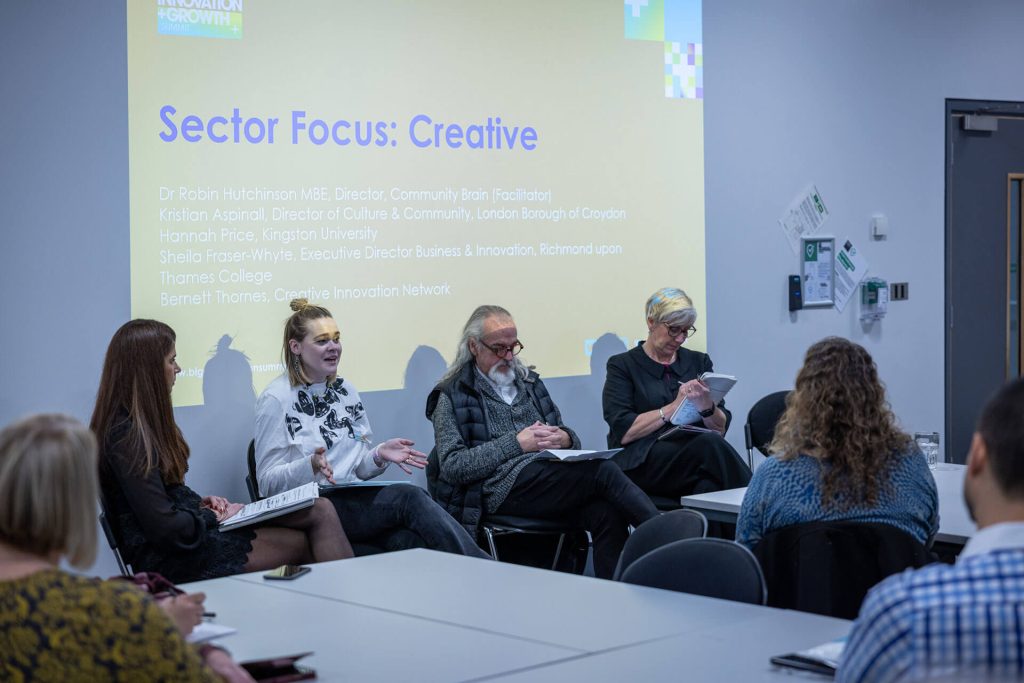Sector Focus: Creative Industries
Panellists: Dr Robin Hutchinson MBE, Community Brain; Hannah Price, Not my Beautiful House; Sheila Fraser-Whyte, Richmond upon Thames College; Bernett Thornes, Kingston University
Collaboration in the creative industry vital for growth
Dr Robin Hutchinson MBE, director, Community Brain led a dialogue focusing on the creative industries in South London and the opportunities that can arise from collaboration at the BIG South London Business Innovation and Growth Summit 2022.
He was joined by Hannah Price, Kingston University, Shiela Fraser-Whyte, Richmond Upon Thames College and Bernett Thornes, Creative Innovation Network.
Mr Hutchinson said, “We’ve always been obsessed with the fact that creativity makes the big spark and the big difference,” he noted that there has always been a very high proportion of people who choose to work in the creative industries in the area, but they have been lured by bigger cities. However, in a post-covid world, people have begun to reassess that transition and are seeking more space, community and a real home, which South London can provide.
Ms Price, gallery manager at Not My Beautiful House, saw this need for space when people began to pick up new skills and crafts. The gallery emerged in the lockdown as a “response to the community”. She said, “they aim to empower local businesses and local creatives in an industry that is really tough to start out in.” Demand is high for the gallery, with 550 applications in the last 18 months, ranging from ages 12 to 90.
Ms Fraser-Whyte believes that colleges and universities have a part to play in making creatives stick to their local area. She said: “The big thing with young people and adults is to deliver a relevant, inspiring, focused and purposeful curriculum, which offers opportunities, and links to the professional industry.” She highlighted that it is difficult to do as the creative industry is so broad and ever-evolving. But the first step is delivering industry-led live projects that have a product in order to get funding, which brings in the professionalism creatives need to survive in their careers.
It was also raised that teaching students to apply their skills, not only in their pathway but in other sectors, could contribute to their sense of security.
“Creativity, problem-solving, and critical thinking are highly sought-after skills that come through in the creative industries, and artificial intelligence cannot take that away,” commented Ms Thornes.
She mentioned her role in delivering the Toy Invention Programme by the Kingston School of Art and Spin Master as her proudest moment yet. She is now involved in the BIG Design Lab, which helps businesses to come together and use design thinking as a central methodology to build businesses and overcome any challenges they may encounter.
It was noted that ultimately it comes down to employment. It was suggested that it should start as early as school career days. Employers need to “plant a seedling” by building brand awareness with a longer-term view. Ideally, they would also be involved in shaping the curriculum and coming in as guest speakers in colleges and universities.
Ms Fraser-Whyte agreed and suggested bringing schools into colleges to do taster days to help young people “start feeding that spark” and understanding more about their pathways into creative careers. She said it is important to help a “very, very young person know that creativity is something they can aspire to. it’s about building that dream and showing them where they’re going to be”. She noted that the industry needs to step up and talk about the opportunities there are and also educate the parents (who are not in the same field).



